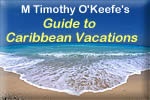What About the Poverty? |
It exists. Want to help? Go beyond the t-shirts and postcards. Spend your money with someone on the beach. Or on the side of the road. |
||||
|
Respect. Islanders value that more than what you can pay them. But let's be realistic. They need to earn an income, too. In the Caribbean, with all the mixed blood, the chance of meeting someone who's hostile because of your skin color isn't as likely as you might think. If you encounter a problem, it's usually based on something else: Poverty, which breeds envy. After watching planeloads and boatloads of tourists walk around for many years, it's not surprising there are islanders who feel resentful. Who wouldn't? The unemployment rate on some islands is as high as 25 percent. There are no jobs, except perhaps seasonal sugar cane cutting and banana picking. So instead of doing nothing, and mooching off relatives, some people go into business for themselves. They want to sell items to the only people who have money. You, a tourist. You may consider it panhandling. For islanders, this may be their only way of making a living. They're the telephone solicitors you can't always avoid. Except you see them face-to-face. On vacation, you have clothes, spending money and a lavish resort lifestyle most islanders can only dream of. So it's understandable a few have taken to panhandling, begging for their share, though in the West Indian culture such conduct is considered bad manners. Some islanders will try to sell you carvings or shells, things you might have no need for. It's the best they can offer based on their circumstances. And if you refuse, they may resent it. You are their only source of livelihood. If the situation was reversed, how would you react? So, instead of another T-shirt, why not buy a shell or a necklace? If this sounds like economic do-gooding, I guess it is. But buying from one also is a way of avoiding other peddlers. Show the next salesperson what you've already bought and they'll often leave you alone. Especially if you know the seller's name. As much as the next one would like to sell to you, they know you've already helped a brother. You've shown respect. And they should return it to you. If you're dealing with the flotsam and jetsam of the beaches, a drugged-out Rastafarian, all bets are off. Why some islands let a hostile Rastafarian take over a beach and pester and irritate tourists--and drive them away--is one of life's great mysteries. These obnoxious drug heads violate their own religious beliefs. But they expect the dreadlocks to impress. A few even wear wigs. They know the dreads will attract female tourists, who discover the phoniness too late. Maybe tourism officials should get out of their air-conditioned offices more and see what's going on. In the Caribbean, helping one another is what island life is all about. Unemployment may be high, but usually no one starves or sleeps in the streets. Family and friends take care of their own. A healthy tourist economy is one of the most important bases an island can have. Some island governments are making their people aware of this, that tourists in their mysterious and sometimes irritating ways, are good for everyone's economic health. On the island of Bonaire in the Netherlands Antilles, the importance of making visitors welcome became a part of the school curriculum. |
|||||
